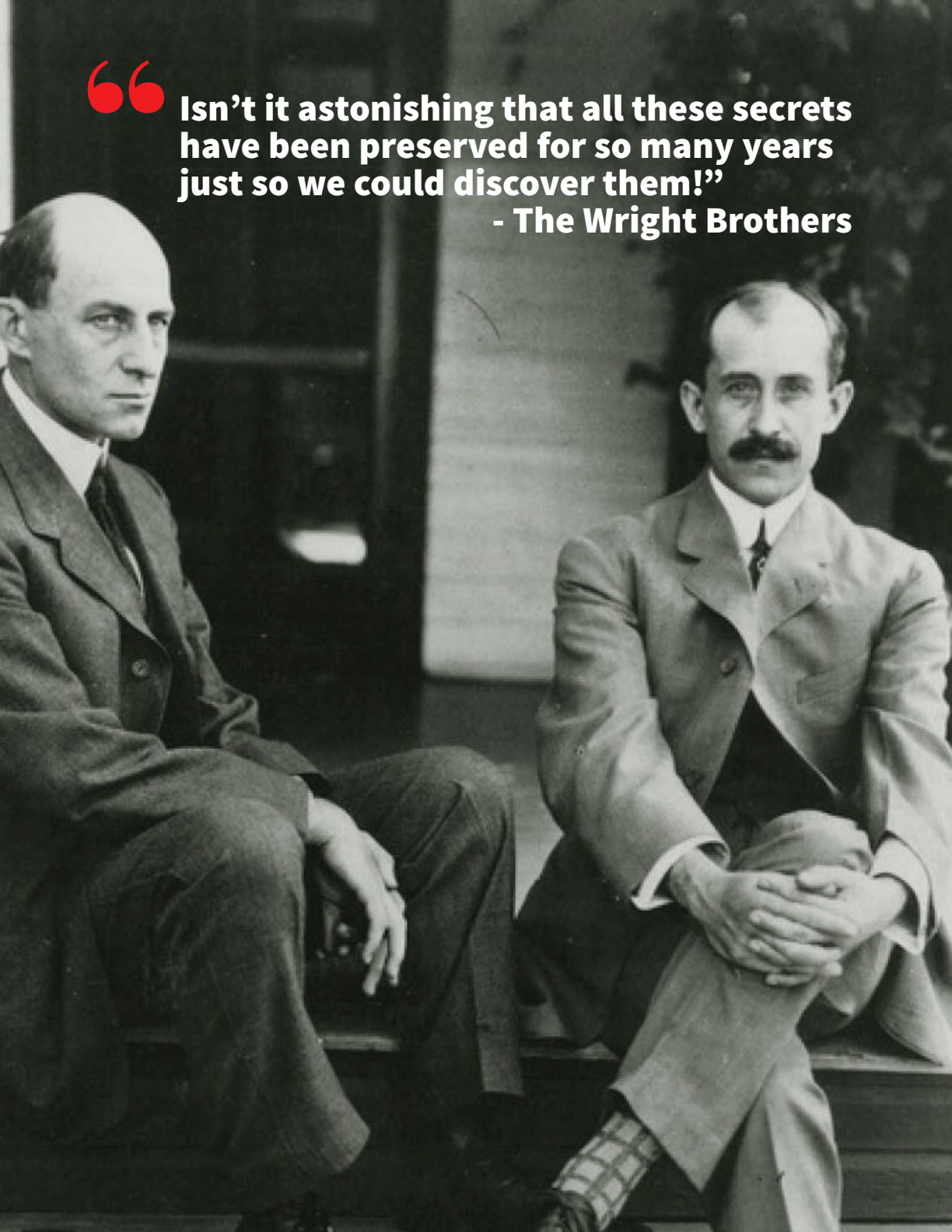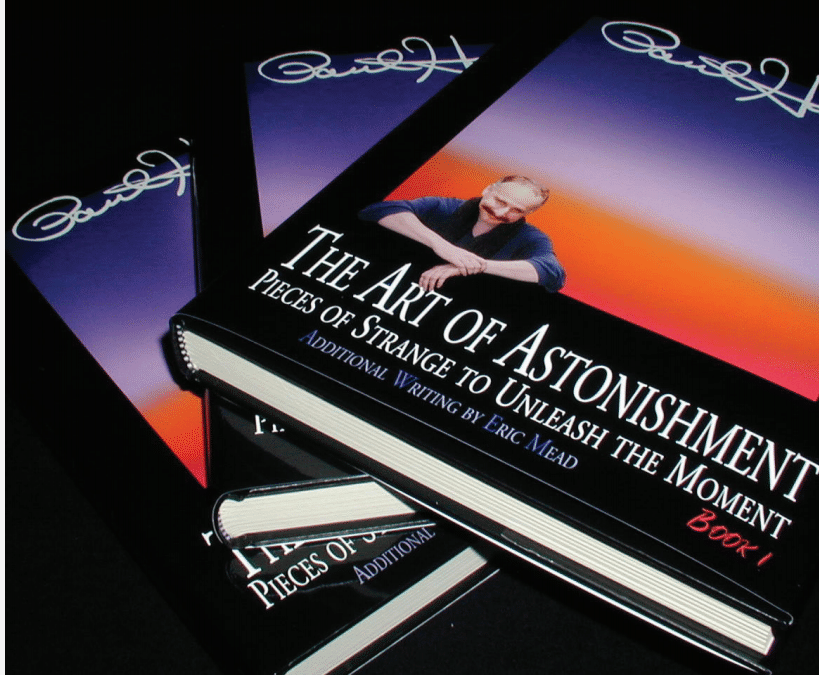“IF YOU TAKE ANY ACTIVITY, ANY ART, ANY DISCIPLINE, ANY SKILL, TAKE IT AND PUSH IT AS FAR IT HAS EVER BEEN PUSHED BEFORE, PUSH IT INTO THE WILDEST EDGE OF EDGES, THEN YOU FORCE IT INTO THE REALM OF REAL MAGIC.” -TODD ROBINS
Astonishment Is Our Natural State Of Mind.
Why ?
The magic arena is a place of infinite possibilities and there’s room to play whatever game you want. But just for a moment let’s play the game of pushing the art into the wildest edge of edges.
All right. Here we go. Think back to your first magical encounter. The seed experience that first excited you then compelled you todo magic yourself. Someone did a trick for you that made you gasp. For me it was when my uncle Paul smashed a newspaper-covered glass through a tabletop. A moment of ecstatic bliss where every thought was pulled from my face leaving nothing more than empty space.
My first instinct was not to hear a joke or to be entertained or to be told a story or to make small talk but to experience that moment again and again. And it’s natural to think if you could learn to do magic yourself, then…well, you could have this experience all the time. But then about three seconds later you realize that it’s fun to know secrets and to do things for people that they can’t figure out. And suddenly you’re out of the astonishment game and into the ego game.
So now you’re a long way from home and from that virgin gasp that motivated the journey. And now you’re performing some of your high-entertainment-value effects and despite yourself a profound moment of astonishment is unleashed. It doesn’t happen every time but when the moon is right and the conditions are just so… there it is, a moment of total white-light astonishment. And you look at those as- tonished faces and maybe you’re not sure what to say, or you feel a little guilty, or a bit uncomfortable because it’s stopped the flow of your show or changed your easy relationship with the audience.
Something powerful has happened. But everyone knows it’s just a trick and you’re “just a magician” so there’s this dysfunctional relationship going on and no one’s sure what to do with this strange experience including yourself.
But in general you’re pretty happy because on some level you realize this is a big win until someone says, “I wish the children were here to see this.” And for a moment you feel your whole game fall apart. Doing magic for children can be glorious. But the frequently voiced opinion that the experience of astonishment is a childish thing makes you wonder about what’s really going on.
If you listen carefully, you’ll also hear things like “that made me feel like a child again” or “you made me feel like a little kid at the circus.” And if you think about this, you’ll see that what these astonished adults are really trying to say, even though they’re not consciously aware of it, is that for a brief moment, they experienced a clear, primal state of mind that they associate with a child’s state of mind. Somehow the adult experience of astonishment triggered some feeling of what it felt like to be a child.
I’m going to say this again because it’s so much fun using the italics button: The experience of astonishment is the experience of a clear, primal state of mind that they associate with a child’s state of mind.
YOU’RE USING MAGICAL ILLUSIONS TO DISSOLVE CULTURAL ILLUSIONS IN ORDER TO EXPERIENCE A MOMENT OF SOMETHING REAL.
PAUL HARRIS

It’s the same experience that seduced you into performing magic in the first place. And if you follow these footprints it takes you right up to the crumbling edge of everything we think we are…and just beyond to a state of mind we experienced naturally as small children but that society devalued, and then made taboo as we became adults.
Here’s basically how it works, give or take a few metaphors
You came into this world a blank slate. No ideas about who you are or what anything is. You’re just being. And it feels great…because there are no options, or opinions or judgements. There is no right or wrong. Everything is everything. That’s what you see in a baby’s eyes. Pure child’s mind. Then, very quickly, we learn stuff. The names of ten thousand things, who we are, what we’re supposed to be, what’s good and bad according to the current rules of the game. And you organize all of this information into little boxes. And when any new information comes along you file it into the appropriate box.
Right now you might be filing these very thoughts into the whack-o ideas box. I understand. You’re just doing your job. You’ve been trained to do this since birth. You have thus created your worldview. There’s no particular reality to any of this. But it’s in your head and you know the territory, and it’s where all your thoughts do their thinking. But we quickly forget what was there in the first place because these thousands of little thought-boxes are stacked up so tight that the original clear space of child’s mind is completely covered up. It’s not gone. It’s just blocked by this wall of over-stuffed boxes.
And then along comes a focused piece of strange in the form of a magical effect. Let’s say this magazine vanishes from your hands. “Poof” no magazine. Your trained mind races into action and tries to put this piece of strange into one of its rational boxes. But no box will hold it. At that moment of trying to box the un-boxable your world view breaks up. The boxes are gone. And what’s left? Simply what was always there. Your natural state of mind. That’s the moment of astonishment. The sudden experience of going from boxes to no boxes. If you can keep the fear-response from arising, you have the experience of going from a cluttered adult mind to the original clear space. Gee, it almost makes you feel like a kid again.
For most people the moment lasts less than ten seconds. Then because we crave the security of our missing world view, we quickly build a new box. The “it-went-up-his-sleeve” box or the “it-was-all-done-with-mirrors” box or even the “I-don’t-know-what-happened-but-I-know-it-was-a-trick” box. And that’s all it takes. One thought, one guess, even a wrong one, and the boxes all come back, natural mind gets covered up, and the moment of astonishment is over.
Astonishment is not an emotion that’s created. It’s an existing state of being that’s revealed. So what’s the point?
This new model redefines the magician’s valuable role in our culture as an “astonishment guide” who can help others experience their natural state of mind. This is a galactic leap from the magician’s current role as a novelty entertainer, or super conman, or Mr. Ego. The pursuit of magic has always been at its purest form a therapeutic experience of our natural state of mind. But that primal experience is so powerful, and the taboo of “losing” our mind is so great, that we water down the experience with jokes and excuses and, “hey, it’s just a trick.”
When the experience of astonishment starts to be recognized as a highly valued destination, the win/lose magician vs. spectator game starts to dissolve. Suddenly you’re both on the same team…equally responsible for getting the most out of the moment.
More experienced spectators who’ve learned to surrender to the moment and sink into the astonishment will be rewarded with a deeper, more sustained experience. Others who feel compelled to fight the moment or treat it as a puzzle to be figured out, will get what they pay for…non-astonishment.
There is a genuine difference in the quality of people’s experience of magic once they understand the new model and take responsibility for the moment. I’ve had the spectators who “get it,” trying to explain it to those who don’t. One astonishee said it was like the difference between tossing down a beer and savoring a fine wine. Someone else referred to it as “gourmet astonishment.”
This model reshapes the perceptions of people who feel, “I was astonished, but I know it was just a trick, so what I experienced
couldn’t have been real or very valuable.” Because now it’s understood that the astonishment and the tricks are not the same thing. The astonishment is real. It’s a brief flash of our natural state of mind.
A place we should all experience more often, [a state of mind that can in particular benefit scientists working at finding answers to some of today’s most pressing and challenging questions…]
Tricks are tools to help unleash moments of astonishment
You and your astonishees can still have fun and tell jokes and play together, but now there’s an understandable therapeutic value to the game. A definite win for all players.
In a nutshell: Magicians are using illusions to dissolve cultural preconceived notions to facilitate an audience experiencing a moment of something real.
Magic is a tool to help unleash moments of astonishment You and your astonishees can still have fun and tell jokes and play
together, but now there’s an understandable therapeutic value to the game. A definite win for all players.
In a nutshell: Magicians are using illusions to dissolve cultural preconceived notions to facilitate an audience experiencing a moment of something real.
Paul harris Bio
Paul Harris is Founder of the Institute for Advanced Astonishment, and <Paul R – maybe we can come up with very short brief bio for Paul…>

Recent Comments